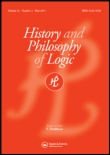
HISTORY AND PHILOSOPHY OF LOGIC
Scope & Guideline
Navigating the Rich Tapestry of Logic's History
Introduction
Aims and Scopes
- Historical Contextualization of Logic:
The journal focuses on the historical development of logical systems, examining how various philosophical traditions and cultural contexts have shaped the evolution of logic. - Philosophical Analysis of Logical Concepts:
It emphasizes the philosophical underpinnings of logical theories, exploring how concepts such as proof, truth, and consequence have been interpreted across different eras and by various thinkers. - Interdisciplinary Approaches:
The journal encourages interdisciplinary research that connects logic with other fields such as mathematics, linguistics, and political theory, fostering a holistic understanding of logic's role in broader intellectual discourses. - Critical Examination of Logic's Foundations:
There is a consistent focus on critiquing and re-evaluating the foundational principles of logic, including discussions on modal logic, intuitionism, and paraconsistency, among others. - Diversity of Logical Traditions:
The journal highlights a variety of logical traditions, including Western, Eastern, and medieval logics, promoting a rich dialogue between different philosophical perspectives.
Trending and Emerging
- Proof-Theoretic Semantics:
Recent papers are increasingly exploring proof-theoretic semantics, reflecting a trend towards understanding the role of proofs in establishing meaning within logical systems. - Intersections of Logic and Politics:
There is a notable rise in publications examining the interplay between logic and political theory, indicating a growing interest in how logical frameworks can inform and critique political discourse. - Cultural and Cross-Traditional Logic Studies:
Emerging themes include studies that integrate various cultural perspectives on logic, such as Eastern and Islamic logics, highlighting an increasing appreciation for global logical traditions. - Mathematical Logic and Philosophy:
The journal is seeing a surge in discussions surrounding the philosophical implications of mathematical logic, particularly in relation to concepts such as infinity and paradoxes, reflecting a broader trend in the philosophy of mathematics. - Feminist and Social Perspectives on Logic:
There is a growing body of work that addresses feminist logic and the social functions of logic, suggesting an emerging interest in how logic intersects with issues of gender and social justice.
Declining or Waning
- Classical Logic and Traditional Syllogisms:
There seems to be a decreasing emphasis on purely classical logical systems and traditional syllogistic reasoning, as more innovative and contemporary approaches take precedence in discussions. - Historical Figures in Isolation:
Research focusing solely on individual historical figures without connecting their work to broader trends in logical development appears to be less frequent, indicating a shift towards more integrative analyses. - Static Interpretations of Logic:
The focus on static interpretations of logical principles, without engaging with their dynamic evolution or application in modern contexts, is becoming less common, suggesting a move towards more applied and contextual studies.
Similar Journals

Logica Universalis
Bridging Theory and Practice in Mathematical LogicLogica Universalis is an esteemed academic journal published by SPRINGER BASEL AG, dedicated to advancing the fields of Applied Mathematics and Logic. With its ISSN 1661-8297 and E-ISSN 1661-8300, the journal has been active from 2007 and continues to contribute significantly to the discourse surrounding mathematical logic and its applications up to 2024. Located in Basel, Switzerland, Logica Universalis holds a notable position within the academic community, evidenced by its ranking within the Q4 category of both Applied Mathematics and Logic as of 2023. While it currently operates without Open Access options, the journal remains a pivotal resource for researchers and practitioners seeking to explore foundational and applied aspects of logic. Moreover, with a Scopus rank of #22/41 in Logic and #464/635 in Applied Mathematics, it provides a platform for comprehensive knowledge dissemination and facilitates innovative research that bridges theoretical and practical methodologies. This journal is instrumental for anyone looking to deepen their understanding and make meaningful contributions to these intertwined domains.
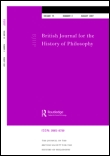
British Journal for the History of Philosophy
Navigating the Complexities of Past PhilosophiesThe British Journal for the History of Philosophy, published by ROUTLEDGE JOURNALS, TAYLOR & FRANCIS LTD, is a leading academic journal dedicated to the exploration and critical examination of historical philosophies and their implications. Founded in 1993 and operating through 2024, this quarterly publication holds a prestigious status, being ranked Q1 in Philosophy with a Scopus rank of 188 out of 806, placing it in the 76th percentile within the arts and humanities domain. The journal is unique in its commitment to showcasing interdisciplinary research, catering to scholars, professionals, and students interested in philosophical history's complexities and developments. Although it does not currently offer Open Access options, it remains an essential resource for contemporary debates and historical insights in philosophy, contributing to the wider academic discourse on ethical, epistemological, and metaphysical inquiries.

Revista de Filosofia-Madrid
Fostering Critical Discourse in PhilosophyRevista de Filosofia-Madrid is a prestigious open access journal dedicated to the field of philosophy, published by the Universidad Complutense de Madrid since 1987. With a commitment to fostering critical discourse and intellectual exploration, this journal serves as a platform for philosophers, researchers, and students alike, offering a range of articles that reflect contemporary philosophical debates and historical perspectives. The journal is indexed in Scopus, ranking in the 41st percentile within its category, and emphasized as a Q3 ranked publication for 2023. The journal’s open access model ensures that its content is freely available to a global audience, promoting widespread dissemination of philosophical knowledge and ideas. As part of its mission, Revista de Filosofia-Madrid seeks to bridge diverse philosophical traditions while encouraging innovative approaches to age-old questions, making it an invaluable resource for anyone engaged in philosophical inquiry.
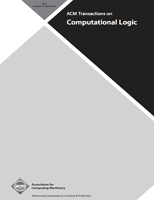
ACM Transactions on Computational Logic
Driving Excellence in Theoretical and Practical LogicACM Transactions on Computational Logic, published by the Association for Computing Machinery, is a premier journal dedicated to the advancement of computational logic, spanning the disciplines of computer science and mathematics. With its ISSN 1529-3785 and E-ISSN 1557-945X, this journal has established itself as a vital resource within the academic community, particularly noted for its influential contributions reflected in its 2023 scopus rankings. The journal holds notable quartile rankings, achieving Q1 in the fields of Computer Science (miscellaneous) and Logic, alongside Q2 in Computational Mathematics and Theoretical Computer Science, indicating its prestigious position in the respective categories. Researchers, practitioners, and students can access a wealth of rigorous research articles that delve into both theoretical frameworks and practical applications of computational logic, fostering innovation and collaboration in the field. As it converges towards its 2024 objectives, ACM Transactions on Computational Logic continues to uphold a commitment to excellence and impact, striving to shape the future of computational theories and methodologies.

JOURNAL OF PHILOSOPHICAL LOGIC
Pioneering New Perspectives in Logical TheoryThe JOURNAL OF PHILOSOPHICAL LOGIC, published by Springer, is a prestigious scholarly journal specializing in the intricate intersections of logic, philosophy, and their diverse applications. Since its inception in 1972, this eminent journal has become a cornerstone of philosophical discourse, attracting leading researchers and scholars in the field. With an impressive ranking of #77 out of 806 in the Scopus Arts and Humanities - Philosophy category and being positioned in the top 10th percentile, it stands as a Q1 journal, denoting its significant impact and rigorous standards in academic publishing. Although not an Open Access journal, it offers access to a wealth of high-quality articles contributing to the advancement of logical theory and practice until 2024. The journal aims to foster a vibrant platform for the exploration and development of philosophical logic, encouraging groundbreaking research and innovative dialogue among professionals and students alike, and solidifying its role as an essential resource within the philosophical community.

ARCHIVE FOR MATHEMATICAL LOGIC
Pioneering Research in Mathematical PhilosophyArchive for Mathematical Logic, published by Springer Heidelberg, is a distinguished academic journal that delves into the intricate realms of mathematical logic and its philosophical implications. With an ISSN of 0933-5846 and an E-ISSN of 1432-0665, this journal is recognized for its rigorous peer-reviewed articles that contribute significantly to the understanding of logical frameworks. As of 2023, it has achieved a commendable Q2 ranking in Logic and a prestigious Q1 ranking in Philosophy, reflecting its impact within these intellectual fields. Operating from the United States with a publishing address in Heidelberg, Germany, the journal encompasses research spanning from 1988 to 2024, providing a rich historical context to contemporary discussions. With its robust Scopus rankings, it stands at the 70th percentile in Arts and Humanities - Philosophy and holds a notable ranking in Mathematics - Logic, further underscoring its relevance. While it is not an open-access journal, it remains vital for researchers, professionals, and students seeking to advance their knowledge and engage with cutting-edge discussions in mathematical logic and its philosophical applications.
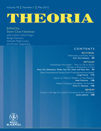
Theoria-A Swedish Journal of Philosophy
Navigating the Depths of Contemporary PhilosophyTheoria - A Swedish Journal of Philosophy, published by WILEY, stands as a significant contributor to the realm of philosophical discourse since its inception in 1935, with a continued commitment to advancing scholarly conversation up to 2024. With its ISSN 0040-5825 and E-ISSN 1755-2567, the journal holds a prestigious position in the field, ranking in Q2 among philosophy journals and achieving an impressive 66th percentile ranking in the Scopus Arts and Humanities category. Although it does not currently provide Open Access options, Theoria remains a vital resource for researchers, professionals, and students seeking in-depth analyses and innovative perspectives within contemporary philosophy. Its central objective is to foster rigorous academic dialogue that explores diverse philosophical inquiries, making it an essential platform for those invested in the pursuit of knowledge and critical thought.
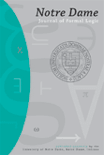
Notre Dame Journal of Formal Logic
Cultivating Insightful Perspectives on Logic and ReasoningNotre Dame Journal of Formal Logic is a premier academic publication dedicated to the advancement of research in the field of logical studies. Published by DUKE UNIVERSITY PRESS, this journal has been a significant contributor to the discipline since its inception in 1960, with an impressive convergence of scholarly articles expected to continue through 2024. With its focus on rigorous formal logic, the journal plays a crucial role in fostering discussions that bridge mathematics and philosophical inquiry, holding a notable Q2 ranking in the 2023 Logic category. Despite its non-open-access status, the journal reaches a wide audience of researchers, professionals, and students committed to exploring the foundational aspects of logics. Located in Durham, NC, it provides a platform for innovative thought and critical engagement within the logic community. With its impactful contributions, the Notre Dame Journal of Formal Logic stands as a vital resource for those seeking to deepen their understanding of both classic and contemporary logical theories.
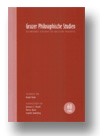
Grazer Philosophische Studien-International Journal for Analytic Philosophy
Challenging Conventional Paradigms Through Rigorous AnalysisGrazer Philosophische Studien - International Journal for Analytic Philosophy, published by BRILL, stands as a pivotal academic outlet in the realm of analytic philosophy. With an esteemed Q1 ranking in the philosophy category for 2023, it reflects high scholarly standards and substantial impact, ranking 161st out of 806 journals in the field. The journal, bearing the ISSN 0165-9227 and E-ISSN 1875-6735, caters to a diverse audience of researchers, professionals, and students, providing a platform for the dissemination of innovative philosophical thought. As it converges its publications from 2011 to 2013 and continues robustly from 2015 to 2024, the journal emphasizes interdisciplinary approaches and encourages contributions that challenge conventional paradigms. Although it currently does not operate under open access, its scholarly articles are crucial for advancing discourse in analytic philosophy, making it an indispensable resource for anyone engaged in rigorous philosophical inquiry.

PHILOSOPHICAL STUDIES
Cultivating a Vibrant Community of PhilosophersPhilosophical Studies, published by Springer, is a prestigious peer-reviewed journal that stands at the forefront of philosophical discourse since its inception in 1950. With ISSN 0031-8116 and E-ISSN 1573-0883, this journal has firmly established itself as a critical platform for disseminating high-quality research in philosophy, positioned in the Q1 category for Philosophy with an impressive Scopus rank of #73 out of 806, placing it in the 90th percentile of its field. Although it does not offer Open Access, the journal’s rigorous selection process ensures that only the most relevant and impactful studies are published, making it an invaluable resource for philosophers, academics, and students alike. With a commitment to advancing philosophical inquiry and fostering a vibrant scholarly community, Philosophical Studies continues to attract contributions that challenge prevailing paradigms and explore new dimensions in philosophical thought. The journal's scope encompasses a wide array of topics within philosophy, encouraging interdisciplinary engagement and dialogue.